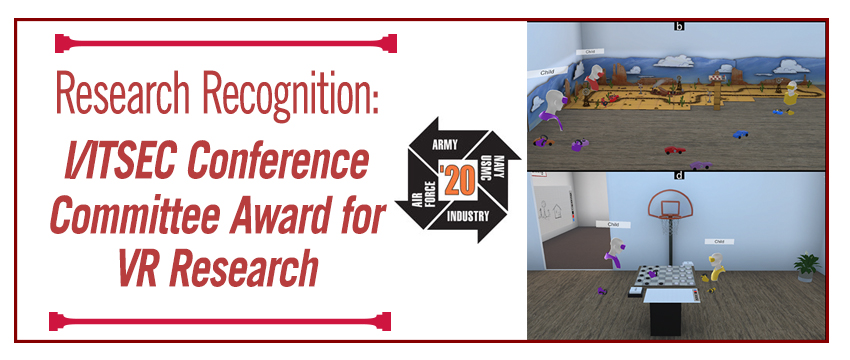Virtual reality research wins best paper for I/ITSEC simulation committee; advances to best conference paper competition

Virtual reality research wins best paper for I/ITSEC simulation committee; advances to best conference paper competition
Research using virtual reality family rooms to bring together members of the military deployed overseas and their families back home has been awarded the best paper in the Simulation committee of the I/ITSEC conference, the world’s largest modeling, simulation and training event, which will be virtual this year.
A team of researchers from the University of Georgia conducted the research and wrote the paper, “Virtual Family Room: Bridging the Physical Distance with Virtual Reality.” The research was funded by a University of Georgia President’s Interdisciplinary Seed Grant awarded by the Office of the Vice President of Research in 2019. Winning in one of the six conference committees qualifies the paper to be considered for the top paper award, which will be presented and named during the virtual conference.
“This project is particularly important for families with young children,” said Sun Joo (Grace) Ahn, principal investigator of the project and an associate professor of advertising at Grady College of Journalism and Mass Communication. “Kids communicate most effectively through shared experiences and while most social VR experiences don’t cater to children, this one does because it is based on age-appropriate, family-based activities.”
The research focuses on a virtual world that is a replica of a family home and backyard. The same Virtual Family Room is shared through Oculus Quest headsets worn by the deployed military member who is away from home, as well as the family members back home. The family can collectively or competitively play common games in this shared space and the activities range from watching a movie together to playing basketball, working on homework or drawing together, among others.
“Regardless where they are, family members are always excited about the opportunity to share the same experience that the family had before deployment, and this application allows them to do that,” Ahn, who is also an Owens Institute for Behavioral Research Fellow, continued.
The paper submitted to I/ITSEC, now referred to as vI/ITSEC, was based on data collected from focus groups where family members simulated a deployment situation and were observed interacting and engaging. The data showed that families felt the interactions were more memorable and realistic than alternatives like video chat.
In addition to scenarios involving military who are deployed overseas, this research has applications for anyone who travels regularly for work or even to those who are separated from loved ones for like many are experiencing because of the pandemic.
Another new application of this research is that it focuses on family health and well-being and not solely on employee productivity which has been the focus of most VR research dealing with employees and work productivity.
“People can’t be productive when their children at home are having issues,” said Ahn, who is also a mother of a young child. “It’s hard for people who travel to focus on work when you have family problems. This application could help address that.”
Ahn and the rest of the team were encouraged to submit the conference paper to I/ITSEC by Martin Bink, director of defense and security collaborations at the University of Georgia. Bink is familiar with the conference and serves on one of the planning committees. Bink said the conference typically averages between 300 and 500 submissions, so the fact this paper was one of six papers that was awarded is impressive.
“The significance of this recognition is that it is a rigorous process and a prestigious conference,” Bink said. “Finding the best ways to use VR is of interest to attendees and the importance of taking care of families and the novel use of technology was probably appealing to the committees judging the projects.”
The researchers involved with this project are all from the University of Georgia and include Dawn Robinson, professor of sociology and Fellow in the Owens Institute of Behavioral Research; Catherine W. O’Neal an assistant research scientist in the Department of Human Development and Family Science and a Fellow in the Owens Institute of Behavioral Research at the University of Georgia; and Kyle Johnsen, an associate professor in the College of Engineering.
Several UGA doctoral students were also involved with the project including the lead author of the paper, Andrew Rukangu (engineering); Kelsey Mattingly (sociology); Anton Franzluebbers (engineering); and Alexander Tuttle (engineering).
The Interservice/Industry Training, Simulation and Education Conference (I/ITSEC) is the world’s largest modeling, simulation and training event and takes place online Nov. 30 – Dec. 4, 2020. Papers competing for the best paper award at the conference come from six committees including Human Performance Analysis and Engineering; Emerging Concepts and Innovative Technologies; Education; Policy, Standards Management and Acquisition; Simulation; and Training. The conference typically attracts nearly 17,000 attendees from a variety of sectors including the military, government, education and medical industries.